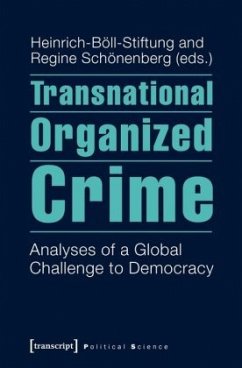Transnational organized crime interferes with the everyday lives of more and more people - and represents a serious threat to democracy. By now, organized crime has become an inherent feature of economic globalization, and the fine line between the legal and illegal operation of business networks is blurred. Additionally, few experts could claim to have comprehensive knowledge and understanding of the laws and regulations governing the international flow of trade, and hence of the borderline towards criminal transactions.
This book offers contributions from 12 countries around the world authored by 25 experts from a wide range of academic disciplines, representatives from civil society organizations and private industry, journalists, as well as activists. Recognizing the complexity of the issue, this publication provides a cross cultural and multi-disciplinary analysis of transnational organized crime including a historical approach from different regional and culturalcontexts.
Conception: Regine Schönenberg and Annette von Schönfeld.
This book offers contributions from 12 countries around the world authored by 25 experts from a wide range of academic disciplines, representatives from civil society organizations and private industry, journalists, as well as activists. Recognizing the complexity of the issue, this publication provides a cross cultural and multi-disciplinary analysis of transnational organized crime including a historical approach from different regional and culturalcontexts.
Conception: Regine Schönenberg and Annette von Schönfeld.
Perlentaucher-Notiz zur TAZ-Rezension
Wolf-Dieter Vogel enthält sich in seiner Besprechung des von der Politikwissenschaftlerin Regine Schönenberg gemeinsam mit der Heinrich-Böll-Stiftung herausgegebenen Bandes "Transnational organized crime" jeglichen wertenden Urteils. Die Kernthesen des Buches referiert er jedoch so angeregt, dass von einer lohnenden Lektüre auszugehen ist. So erfährt Vogel etwa, dass die Globalisierung, indem sie den internationalen Handel befördert, das organisierte Verbrechen erheblich begünstigt, und dass der Handel mit illegalen Waren, Organen und Menschen von ein und denselben Gruppen ausgeführt wird. Die Hoffnung, dass die Legalisierung von Drogen das Problem des Schmuggels lösen würde, wiederlegt die Herausgeberin dem Rezensenten: dann schmuggeln die Banden eben mehr Menschen.
© Perlentaucher Medien GmbH
© Perlentaucher Medien GmbH
Reviewed in:
taz, 20.06.2013, Wolf-Dieter Vogel
taz, 20.06.2013, Wolf-Dieter Vogel

